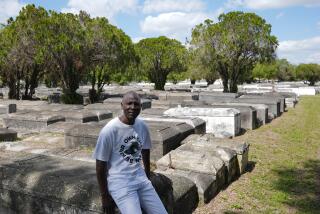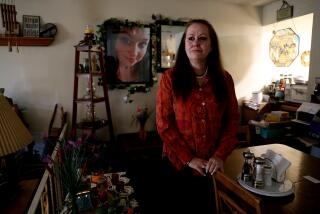Count Them Out : Parents Want Justice Their Own Way--Even If It Means Scotching Settlement
- Share via
Kenneth Beets remembers the day a decade ago when he and his wife scattered the ashes of their only child, the victim of a hit-and-run driver who was never caught, over the Pacific.
“It was beautiful. It was just a beautiful day,” said Beets, 69, of Fountain Valley.
“Birds were wheeling around the ship. The sunlight would reflect off those ashes 20 feet down.
“We were calm. We knew we had to hold onto each other to get over it.”
Beets, a former Army aviator, World War II veteran and Oklahoma native, had at first resisted the idea of cremation. But he said he bowed to the wishes his son had often expressed.
“When they buried him, I figured exactly where, in terms of latitude and longitude,” Beets said. “I wrote it down in the family Bible, with our wish that upon our death, we would be cremated and our ashes scattered at the same spot.”
But the vibrant, soothing memory turned to shock and anguish when the Beetses heard about the “cremation cases,” lawsuits in which Harbor Lawn Memorial Park and others were accused of desecrating the remains of the dead and commingling their ashes.
Among the emotions that swept over Beets was one that was unfamiliar but with which he would become intimately acquainted: a thirst for vengeance.
Today, the Beetses are the only two victims out of hundreds in a massive group of civil lawsuits who refuse to accept a settlement that would provide up to to $30 million as compensation for emotional distress to customers of Harbor Lawn between July 1, 1978, through July 31, 1983.
“Everybody has to do what he’s got to do,” Beets said. “They can settle if they want to. But I don’t want to. I want justice if there’s not a dime in it.”
The son, Kenneth Jr., was 38 when he died. He was in the floor-covering business with his father and lived at their home. Beets said his son owned a motorboat that he kept in Dana Point Harbor and loved the sea.
The grieving father went to some trouble to look into his son’s unorthodox burial wishes. He called an old military friend, a Navy chaplain who had performed burials at sea, to be certain that cremation was religiously acceptable. Then he said he checked out the Neptune Society, which offered such services, to make sure everything would go as planned.
“Or at least we thought we had investigated it,” Beets lamented. “We certainly didn’t do a very good job.”
Attorneys for Harbor Lawn have declined to discuss individual cases but has denied any wrongdoing.
Hearing the allegations against Harbor Lawn left Beets uncertain about his son’s remains. He felt angry and guilty.
“I think that’s what made my wife’s health start failing,” Beets said. “I know it shattered me. Ever since that time, I haven’t been able to function as I used to function. Maybe it would have been different had he not been the only kid we had.
“I was never a suspicious person. Now I wouldn’t believe the sun was shining outside till I went out and saw it for myself.”
And he has lost faith in himself, he said, as well as trust in others.
“It’s the worst thing that had ever happened to us, absolutely. The fact that I did not see to it myself, that I trusted the Neptune Society, just flat done me in. I failed him,” Beets said. “I failed the only kid that I had by not making sure.
“Deep down inside there’s still the knowledge that I didn’t look into it.
“No way (the settlement is) punishment enough.”
So today, exorcising his personal demons means pursuing his lawsuit, come what may. He knows that all sides feel that unless he is denied his goal and is forced to accept the settlement, it could unravel for everyone.
“Succeed? I hope we can. We’ll go all the way. We want a jury of our peers; we want to go to trial. That’s why we filed suit in the first place. I don’t know what other people think. I only know what I think. It isn’t right.
“I don’t want a jury of lawyers, or of newspaper reporters, just common ordinary people like me and Florine.”
The task of translating anguish into dollars and cents is the challenge of cremation settlement. Part I, Page.1
More to Read
Sign up for Essential California
The most important California stories and recommendations in your inbox every morning.
You may occasionally receive promotional content from the Los Angeles Times.













